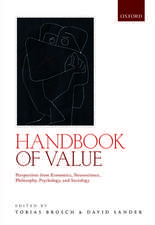Expressiveness in music performance: Empirical approaches across styles and cultures
Editat de Dorottya Fabian, Renee Timmers, Emery Schuberten Limba Engleză Hardback – 3 iul 2014
Preț: 634.39 lei
Preț vechi: 854.04 lei
-26% Nou
Puncte Express: 952
Preț estimativ în valută:
121.42€ • 125.13$ • 102.51£
121.42€ • 125.13$ • 102.51£
Carte tipărită la comandă
Livrare economică 20-26 februarie
Preluare comenzi: 021 569.72.76
Specificații
ISBN-13: 9780199659647
ISBN-10: 0199659648
Pagini: 422
Dimensiuni: 172 x 258 x 29 mm
Greutate: 0.9 kg
Editura: OUP OXFORD
Colecția OUP Oxford
Locul publicării:Oxford, United Kingdom
ISBN-10: 0199659648
Pagini: 422
Dimensiuni: 172 x 258 x 29 mm
Greutate: 0.9 kg
Editura: OUP OXFORD
Colecția OUP Oxford
Locul publicării:Oxford, United Kingdom
Recenzii
This book is hard to summarize succinctly precisely because it bravely attempts to capture some of the richness of musical materials and contexts that future studies of expressivity need to take on board if they are to give a fuller and more authentic account of the role of expressivity in musical experience. It should thus serve as an indispensable primer for those wanting to ensure that their explorations of this problematic concept are not limited by a too narrow vision of what musical expression is and in what contexts it can get manifested.

























